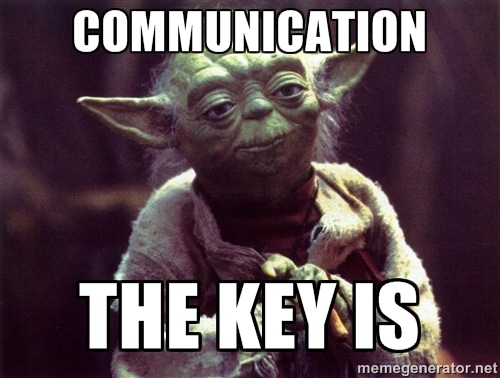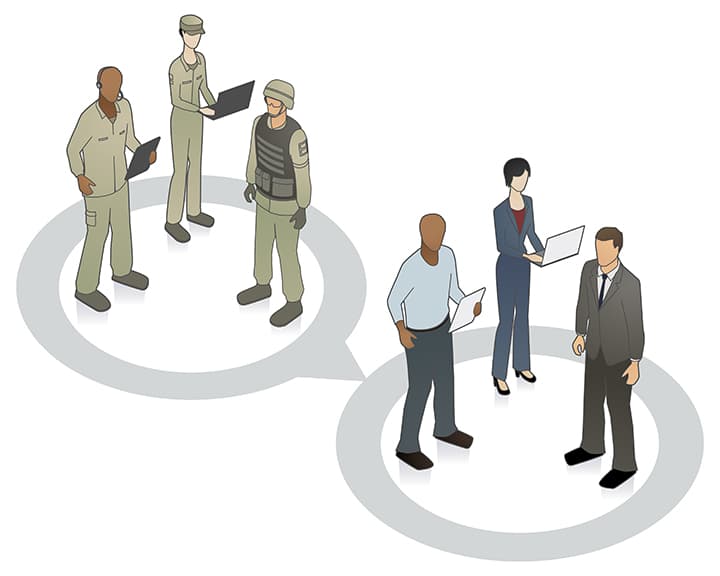
- The App
- Sandboxx News
- Resources
Learn
- Company
About
Become a Partner
Support
- The App
- Sandboxx News
- Resources
Learn
- Company
About
Become a Partner
Support
Feeling overwhelmed by your civilian job search? Uncertain of the communication skills you will need as you transition back into the professional civilian world? Sandboxx...

Feeling overwhelmed by your civilian job search?

Sandboxx has teamed up with Betts Recruiting to help you smartly navigate your career transitions and avoid common pitfalls. Get helpful content, tailored for where you are in your military journey, each week in the Sandboxx app!
You know communication is what makes any good team run smoothly and efficiently. It is also one of the most important pillars of leadership. Luckily, these rules apply in both the military and in any professional civilian workplace. Although you likely built strong communication skills from your time in service, they will need to be altered a bit in preparation for your re-entry into the your civilian profession.
The following 5 key communication tips will help you refresh your current communication habits as well as develop new skills that are vital to success in today’s modern *civilian* workplace.

We live in an age where practically any question can be answered on Google. There is an endless wealth of information at our fingertips, and one of the most important aspects of communication is being able to understand and relay information in a productive and effective way.
One of the most important aspects of communication is being able to understand and relay information in a productive and effective way.
There is nothing worse than a one-sided conversation. This applies to all aspects of the civilian workplace, whether you are interviewing for a job, engaging in conversation with your new team about a project, or giving a presentation to your co-works.
It doesn’t matter if it’s you who isn’t listening or those that you’re addressing; information is lost just the same.
It doesn’t matter if it’s you who isn’t listening or those that you’re addressing; information is lost just the same.
This cuts down on productivity and weakens team dynamics. Listening might seem pretty obvious, but take a minute to think of how many times you’ve tuned out to run through your mental to-do list or been distracted by that crazy car or that adorable dog while in a conversation with someone.

Cell phones, social media, and texting don’t help either. So, in this world with hundreds of constant, distracting inputs, how can you learn to listen better?
Now that we’ve covered the general specifics of comprehending and responding to information in the workplace, it’s time to get a little more specific. You can communicate using your phone, email, a hand-written response, or an in-person conversation. How do you decide?
First, consider the nature of the information you want to communicate. If it is personal or relating to a delicate matter, you might want to deliver it in person.
Second, consider your relationship to the recipient. Some professional relationships are more formal than others and thus require different modes of communication.
Third, be accurate. People appreciate details and, unfortunately, will notice if you misspell words or leave out details.

Every workplace is different and is going to provide you with different communication-related challenges. Additionally, every office encourages its own specific brand of work environment, and it might take you awhile to adjust and figure out what is appropriate.
Every office encourages its own specific brand of work environment, and it might take you awhile to adjust and figure out what is appropriate.
This is totally OK. It is important that you keep your mind open and observe the workplace dynamics in order to figure out how things run on a day to day basis and what forms of communication are used most often. This might involve asking yourself some important questions such as:
The answers to these questions will only become clearer as you adjust to your new professional setting.

This might have seemed like a whole lot of do’s and don’t’s, but it is always important to look at the big picture and remember that developing communication as a skill will only lead to your success.
With technology as advanced as it is, communication these days might seem easier than ever, however, this isn’t necessarily true. Focusing on how you understand and relay information to those around most effectively will make you both a better team member and a better leader. So don’t skimp on developing how you communicate, because it will definitely be appreciated by your co-workers, increase your work productivity, and ease your transition into the civilian professional world.
Stay tuned to this series to:




